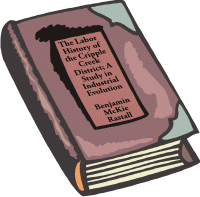 |
Victor
|
The Labor History of the Cripple Creek District;
A Study in Industrial Evolution
by Benjamin McKie Rastall

pages 164-166
BIBLIOGRAPHY
THE STRIKE OF 1894
Canfield, John G., Mines and Mining Men of Colorado, Denver,
1893.
Tange, Thomas, Colorado Mineral Resources.
Calhoun, W. C., Colorado's Gold Fields, Quarterly Sentinel,
Jan., 1897.
Wells, David C., The Teaching of our Recent Economic Experiences,
Forum, Jan., 1894.
Proudfit, John "W. & Co., Cripple Creek, Colorado Springs, 1895.
Warren & Stride, Cripple Creek Illustrated, Denver, 1896.
Manning, J. F., The Wonderful Cripple Creek District, Colorado
Springs.
De LaVergne, E. M., Early days of Cripple Creek, Colorado
Springs, 1894.
Mining Stock Manual, Colorado Mining Stock Exchange, 1896.
Hall, Lincoln H., Official Cripple Creek District up to Date,
Cripple Creek, 1896.
Biennial Report of the Adjutant General, Colorado, 1893-1894.
Fourth Biennial Report of the Bureau of Labor Statistics, Colorado,
1893-1894.
Messages of Governor Waite to the Legislature.
Impression Copies of Orders to Colorado State Militia, May
and June 1894. Office files of the Adjutant General.
Report of the United States Commissioner of Labor 1905. Labor
Disturbances in Colorado, Senate Document No. 122,
58th Cong. 3d. Session.
Langdon, Mrs. Emma F., The Cripple Creek Strike, Denver,
1905.
Calderwood, John, Reminiscences of the Cripple Creek Strike,
(Not published).
Official Statement of Miners' Unions, Cripple Creek Crusher
June, 1894.
American State Reports, Vol. 44. pp. 127-133.
Mills' Annotated Statutes of Colorado, Vol. 1, Sec. 856; Vol. 3,
Sec. 3294 A.
District Court Records, Colorado Springs, March to May 1895.
People vs. D. M. MeNamara and others.
People vs. Jackson Rhines.
People vs. Robert Dunn and others.
People vs. Robert Lyons and others.
People vs. Nicholas Tully and others.
Colorado Newspapers for the entire strike period.
Cripple Creek Crusher.
Colorado Springs Gazette.
Evening Telegraph, Colorado Springs.
Rocky Mountain News, Denver.
Republican, Denver.
Times, Denver.
Post, Denver.
THE STRIKE OF 1903-1904
Special Report of the United States Commissioner of Labor
1905. Labor Disturbances in Colorado, Senate Document
No. 122, 58th. Cong. 3d. Session.
Official Statement of the Colorado Mine Operators' Association.
Senate Document No. 86, 58th. Cong. 2d. Sess.
Official Statement of the Western Federation of Miners. Senate
Document No. 163, 58th. Cong. 2d. Sess.
Ninth Biennial Report of the Bureau, of Labor Statistics,
Colorado, 1903-1904.
Biennial Report of the Adjutant General, Colorado, 1903-1904.
Biennial Report of the Auditor of State, Colorado, 1903-1904.
Official Proceedings of the Annual Conventions Western Federation
of Miners of America 1902, 1903, 1904, 1905.
Stenographer's Manuscript of Testimony before Coroner's Juries
in the Vindicator Explosion, Independence Explosion,
and Victor Riots.
District Court Records, Cripple Creek, 1903, 1904, 1905.
Stenographer's Manuscript in District Court Case No. 7527
(Train Wrecking).
Criminal Record of the Western Federation of Miners, Compiled
by the Colorado Mine Operators' Association. Colorado
Springs 1904, "The Red Book."
Reply of the Western Federation of Miners to the "Red Book"
of the Mine Operators' Association, Denver, 1904. "The
Green Book."
Walter Wellman's Indictment of Moyer, Haywood, and the
Western Federation of Miners. Pamphlet by Mine Owners'
Association, Cripple Creek, 1904.
Langdon, Mrs. Emma F., The Cripple Creek Strike, A History
of Industrial Wars in Colorado. Denver, 1904. Officially
adopted by the Western Federation.
Bartholomew, H. E., Anarchy in Colorado. Who is to Blame T
Denver, 1905.
Baker, Ray Stannard, The Reign of Lawlessness, Anarchy and
Despotism in Colorado, McClures, May 1904.
Mills, J. Warner, The Economic Struggle in Colorado, The
Arena, 1905-1906.
The Miners' Magazine, Denver, 1903, 1904, 1905.
Wilshires Magazine, New York, 1903, 1904, 1905.
The Appeal to Reason, Girard, Kas., 1903, 1904, 1905.
Colorado Newspapers for the entire strike period:
The Post, Denver.
The Republican, Denver.
The Times, Denver.
The Rocky Mountain News, Denver.
The Gazette, Colorado Springs.
The Evening Telegraph, Colorado Springs.
The Times, Cripple Creek.
The Record, Victor.